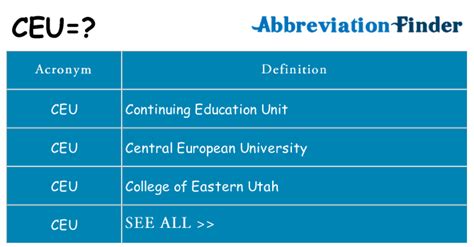CEU stands for Continuing Education Unit. It is a nationally recognized unit of measurement for non-credit continuing education and professional development activities. CEs are awarded for participation in educational activities that are offered by accredited providers and meet specific criteria.

Why are CEs important?
CEs are important for several reasons:
- They provide a way to track and measure participation in continuing education and professional development activities.
- They can be used to demonstrate commitment to ongoing learning and professional development.
- They can be required for certain professions and licenses.
- They can be used to advance your career.
How can I earn CEs?
CEs can be earned by participating in a variety of educational activities, including:
- Attending conferences and workshops
- Taking online courses
- Reading books and articles
- Participating in webinars and podcasts
- Completing self-directed learning activities
How many CEs do I need?
The number of CEs you need to earn depends on your profession and license requirements. Some professions require a certain number of CEs every year, while others require CEs only when renewing your license.
How can I find CE providers?
There are many accredited CE providers that offer a variety of educational activities. You can find a list of accredited CE providers on the website of the National Association of State Boards of Education (NASBA).
What are the benefits of earning CEs?
Earning CEs can provide a number of benefits, including:
- Increased knowledge and skills
- Enhanced professional development
- Career advancement
- License renewal
- Personal satisfaction
Conclusion
CEs are an important way to track and measure participation in continuing education and professional development activities. They can be used to demonstrate commitment to ongoing learning and professional development, and they can be required for certain professions and licenses. Earning CEs can provide a number of benefits, including increased knowledge and skills, enhanced professional development, career advancement, license renewal, and personal satisfaction.
FAQs
What is the difference between CEs and credits?
CEs and credits are both units of measurement for educational activities. However, CEs are specifically for non-credit continuing education and professional development activities, while credits are typically used for credit-bearing courses that can be applied towards a degree or other formal credential.
How can I get my CEs verified?
CEs can be verified by the provider that issued them. Many providers will offer a certificate of completion or a transcript that can be used to verify your CEs.
How can I use my CEs to advance my career?
CEs can be used to advance your career in a number of ways. They can be used to demonstrate your commitment to ongoing learning and professional development, and they can be required for certain promotions and job opportunities.
Tables
Table 1: Number of CEs Required for Different Professions
| Profession | Number of CEs Required |
|---|---|
| Registered Nurse | 30 |
| Certified Financial Planner | 30 |
| Certified Public Accountant | 40 |
| Social Worker | 30 |
| Teacher | 15 |
Table 2: Accredited CE Providers
| Provider | Website |
|---|---|
| National Association of State Boards of Education | https://www.nasba.org |
| American Nurses Credentialing Center | https://www.nursingworld.org/ancc |
| American Institute of Certified Public Accountants | https://www.aicpa.org |
| National Association of Social Workers | https://www.socialworkers.org |
Table 3: Types of Educational Activities That Can Earn CEs
| Activity | Description |
|---|---|
| Attending conferences and workshops | Participate in educational sessions led by experts in your field. |
| Taking online courses | Learn at your own pace with online courses offered by accredited providers. |
| Reading books and articles | Stay up-to-date on the latest trends and research in your field by reading industry publications. |
| Participating in webinars and podcasts | Listen to experts share their insights on a variety of topics related to your field. |
| Completing self-directed learning activities | Design your own learning experience by reading, researching, or practicing new skills in your field. |
Table 4: Benefits of Earning CEs
| Benefit | Description |
|---|---|
| Increased knowledge and skills | Stay up-to-date on the latest trends and research in your field. |
| Enhanced professional development | Gain new skills and knowledge that can help you advance your career. |
| Career advancement | Earn CEs to qualify for promotions and job opportunities. |
| License renewal | Maintain your professional license by earning the required number of CEs. |
| Personal satisfaction | Learn new things and grow your knowledge and skills. |
